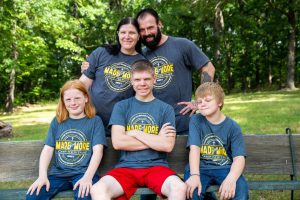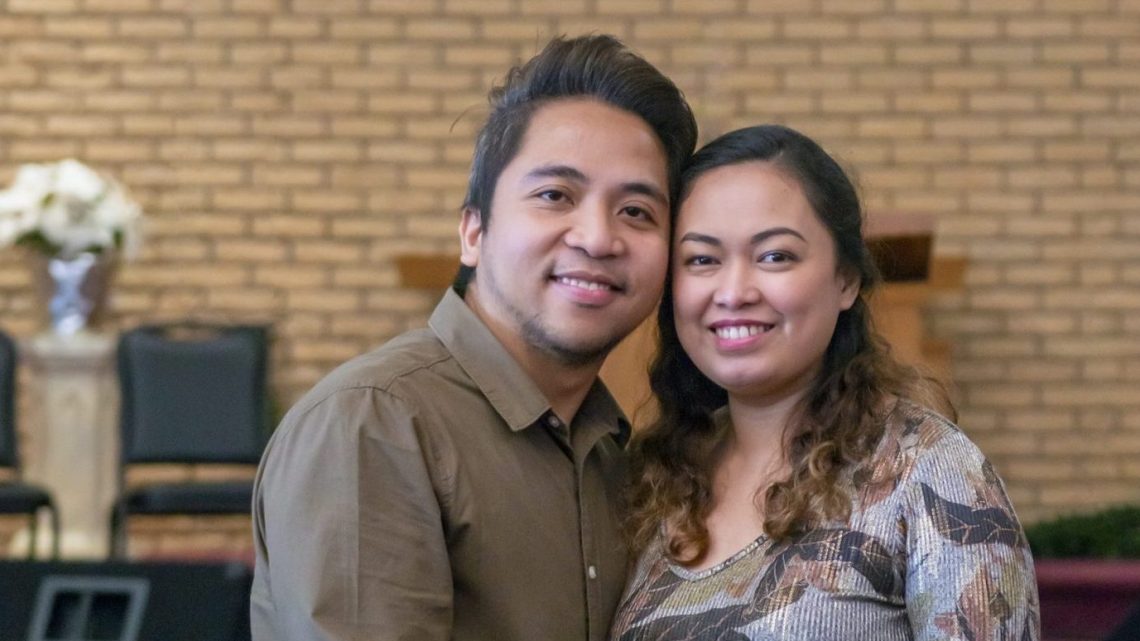It’s Friday and the sun is setting. You look out at the sky and marvel at the streaks of pink hues turning purple. Do you feel joyful? Rushed? Disappointed? Or ambivalent? Sabbath has arrived every week since Creation, and there are those who greet it with a nominal nod, those who celebrate it and those who see it as simply another day to end the week. What’s your take?
The question of how one spends their time on Sabbath was proffered to several people in the Mid-America Union to collect an unscientific survey we thought would be helpful to our readers. First, though, I would like to explore how keeping the Sabbath has changed over generations of Adventists.
We posed five questions to members of the Mid-America Union to see how they spend their Sabbaths. These answers represent a busy family, a young couple, and a pastoral family.
Rachel
Rachel Ashworth is the mother of three boys ages 9, 11 and 13. She and her husband both work from home and help in the homeschooling of their children. She writes a blog for OUTLOOK magazine entitled, “Home, School, and Church. Rachel has suggestions there but check out her blog Sabbath Slow Down for more ideas. Of course, not everything works for all people, even Rachel admits that they’ve had to evolve with their plans as the children get older. Their small church in Missouri, however, provides one of the biggest blessings: family. “After chu rch, we, my brothers’ family, and sometimes church members go to my mom and dad’s house for lunch. We spend all afternoon there, where the kids play and the adults visit.
rch, we, my brothers’ family, and sometimes church members go to my mom and dad’s house for lunch. We spend all afternoon there, where the kids play and the adults visit.
Other suggestions include:
-“Since it was produced and made public, we have watched The Chosen every Friday night as a family.
-“I sing a Happy Sabbath song (to the tune of “Happy Birthday”) to my youngest on Friday nights.
-“The kids each get to have coffee (flavored cappuccinos) on Sabbath mornings, which they generally choose to put in a travel cup and bring to church with them.”
-We just started a tradition this fall/winter of having a bonfire and roasting marshmallows around a campfire in the backyard to clos
e Sabbath. Sitting around the fire without electronics, talking with the boys, and enjoying nature is a special way to end it.” This busy family sees the Sabbath as a special time to relax and worry less about living and learning. They also love to visit others’ homes.
When I asked what advice Rachel had for us, she said, “I would encourage anyone who can do so to take time away from technology on Sabbath, especially social media. Also, there is tremendous pressure to “do” Sabbath right. Keeping the Sabbath was never meant to be about all the things we cannot do but all the things we can. It’s a special day when we have time to call the people we love. We can sit in a chair, sip a hot drink, and read. We can go on a drive to watch how the trees are budding and changing colors. We can save money by driving less and buying less. We can relax by choosing to loosen our schedule. If someone I know is struggling with experiencing Sabbath, I would ask them, what can you do today to make it special?”
Chrys
 Chrys and Alvin are recently married with no children and have moved here from the Philippians. We seem to think that the Sabbath is mostly important for our children, and it is, but what do you do when you don’t have any?
Chrys and Alvin are recently married with no children and have moved here from the Philippians. We seem to think that the Sabbath is mostly important for our children, and it is, but what do you do when you don’t have any?
Chrys started as a teenager getting involved in missions: “The group decided to spend one sabbath outside the campus to a remote area. To reach the place, we had to walk about an hour going uphill through the mountain. It was a long journey, and the trail were so narrow and slippery but when finally we reached the top, I was so amazed at God’s creation. It was so refreshing that I feel like God is talking to me in nature. We spent our Sabbath by leading the sabbath school (adult and kids), providing a divine service, and the AY program until the sun set. Also, we brought them necessities (food, clothing and some hygienic supplies) and you could see their faces filled with joy. Although, it was an exhausting travel, my heart was full because I got the opportunity to share God’s goodness especially to the indigenous people in the mountains.”
Her suggestions for making the Sabbath a happy day were this: “Sabbath is all about Him for what He has done in our lives and so setting aside worldly cares or laying our burdens to Him will give us peace, and in that we will find rest for our souls. Also, we can celebrate Sabbath by following Christ’s example in helping others: feeding the hungry, clothing the naked, healing or taking care of the sick, visiting the prisoners, the fatherless and widows.”
Keith
Keith did not have the privilege of growing up Adventist, yet he proudly proclaims, “I am the product of evangelism!” And it’s quite a story how a one-on-one friendship plus Amazing Facts brought this man and his family into the ministry of the Adventist Church. Pastor Keith Hackle shepherds the Agape SDA church in Missouri among other jobs.
“Our Sabbath celebration has varied over the years, but constants have been: a family meal, taking photos, a reading of the Word, singing and occasionally a Bible based film. One might say that initially we were semi-legalistic. We shied away from interactions with friends and family members that weren’t Adventist, we over-analyzed every action and decision. Largely because we were serious about the decision that we’d made and didn’t want to offend our God. What helped us was having a group of individu

als that had children like we did, that loved God like we did, that invited us to potlucks. At these gatherings we learned what it means to make Sabbath a delight.”
Perhaps you would think a pastor has pat answers that you’ve heard too many times, but not this one. Keith has mighty advice on how to enhance your Sabbath experience: ”To enhance your Sabbath experience, allow your Sabbath experience to be a reflection of your relationship with God not your attempt to live up to the expectations of mankind. I don’t want to intentionally offend Him, misrepresent Him or underrepresent Him. I seek to make the Sabbath a delight for not only me but also for Him as He spends this special time with me. To enhance your Sabbath experience, seek opportunities to make your Father smile! “
I love this! And I keep seeing similar answers peppered throughout the interviews here. I see nature as a big deal to most, getting together with family and friends, missions and helping others are also vital. But most of all, it’s having that relationship with Jesus that propels you into His arms on Sabbath, the celebration of getting closer to the One we love, and who loves us so much more.
Sabbath Traditions over the Generations
It is now possible to have seven generations of Adventists. I found a fourth-generation Adventist octogenarian approaching her 90th birthday. Next, I contacted a middle-aged man who is a fifth-generation Adventist. Lastly, I found a Millennial who is a sixth-generation Adventist. Each one was asked the same questions:
- Please provide the year you were born, for age reference.
- As a child (between 7 and 15) describe your memory of a pleasant Sabbath day.
- What do you remember your parents telling you was inappropriate behavior for Sabbath?
- Were you instructed formally (in Adventists schools or Sabbath school) on biblical and traditional ways to keep the Sabbath?
- What advice would you give your peers today on making the Sabbath a celebration?
Margie
Margie was born in 1933 in Loma Linda, California. Her parents had traveled from Battle Creek, Michigan just a few years earlier. She and her sister grew up with their father being the judge of Loma Linda. In her legacy Margie had a few influential Adventist ancestors, including the first president of the Maine Conference, and the first treasurer of the North American Division. You might think that a child growing up under these influences would have a strict life…maybe she did. But her answers to the above questions showed her family enjoyed their weekly respite, starting with Friday afternoon.
“Everything was cooked and ready for Sabbath before Friday night. The house was cleaned and we would have finished our baths an hour before sundown. Then we would gather around the piano; Mother would play and the rest of us would sing out of the hymnal. Music was a very important element in our early lives.”
Never was there a suggestion that they may not go to church. Each week they were there participating in the services. The girls were taught to never whisper in church and their demeanor was one of respect to the sanctuary, to the pastor and to the other members.
Her pleasant Sabbath afternoon memory was “Daddy taking us out to see the birds.” Nature was very important as an auxiliary teacher of God’s love. As for inappropriate behavior on the Sabbath, never were they allowed to go swimming (even in their own pool) until the sun went down on Sabbath.
Margie had three suggestions for enjoying the Sabbath: “A person needs to enjoy the Sabbath before he can get someone else to enjoy it. And socializing… I think we need to socialize more on the Sabbath. Too often we bury ourselves, either because of physical or social problems. Finally, get the kids involved by using nature: rocks, bugs, birds, fish or flowers. I never failed to interest the kids in God’s creative works.”
*****
Henry
Henry was also educated in the Adventist school system and received a medical degree from Loma Linda University. He, as well, had some auspicious names in his Adventist lineage. He is a baby-boomer and a fifth-generation Adventist. He says he always loved it when his family went camping or vacationed at the beach. “Every Sabbath was a joy of playing in the woods, hiking, walking on the beach, swimming in the ocean, driving through the country or boating on the water and looking at the animals and fish. I felt happy, content and close to a God who loves animals and His creation. These were the best Sabbaths ever.”
Some rules were confusing to Henry, especially as a child. His parents wouldn’t mow their lawns on Sabbath, but if a shut-in person needed that help, doing so on Sabbath was OK. He and his siblings weren’t allowed to go to their friends’ houses because they didn’t “keep the Sabbath.” No worldly pleasures were allowed, “even though I wasn’t sure what that meant at the time.”
Henry didn’t hesitate to answer the last question; “Make it fun and be outside as much as you can. Kids love to be outside if you can pull them away from social media and electronics. It takes work and persistence, but you will be rewarded with a happier and healthy kid. Make the Sabbath special with special food and activities (outside). Make a tradition of family closeness Friday night with a meal that the kids love. You, as a parent, represent God to your kids; make Him fun because He is!”
*****
Jasmine
Jasmine is a sixth-generation Millennial Adventist who attended church school through her elementary years and Southern Adventist College. She went to the local high school and received her post-graduate degree from a private university. She and her brother went to Sabbath School and church every weekend. Her fondest memories were:
“Growing up, we lived by the Smoky Mountains. They were only about a 15-20 min drive away from our house. One of my favorite memories is during the summertime in TN, when it’s super humid and hot, we’d eat a quick lunch at home after church or we’d pack a picnic and take off to the mountains. My parents would find a fun, easy, hike or trail to take and we’d almost always end up by a running river or stream. We’d spend all afternoon playing in the cool mountain spring water, enjoying the nature all around us and a break from the normal “everyday” grind of being at home and in town. This is always a refreshing and contemplative experience as a child, and I remember finding a lot of peace and joy in these mountain outings.”
Her parents also provided confusing rules for her, “Anything that did not somehow help you reflect on God or bring you closer to Him [was inappropriate]. This included a lot of things for us like watching tv, or being on electronics, sometimes limiting the types of toys we played with or how we played, and even the people we would interact with. It included not working, shopping, or using any sort of “services” from people. I remember being confused that we could go to the mountains and wade around in the water but swimming in our family pool was sort of taboo.”
Another common theme we find emerging from these three interviews is the confusion surrounding the dos and don’ts of what was supposed to happen on this one special day. Jasmine summed it up with her advice to her peers:
” I think that pivoting from the legalistic, traditional mindset of the Sabbath is helpful. I believe that Sabbath can be celebrated differently for each person. Some of us find joy in reconnecting to nature because it is a reflection of God. Some of us absolutely need rest on Sabbath and should take that time to be in tune with God, sleep, rest, recharge. Others attend church every weekend as their traditional activity. And some find solidarity in fellowship. I do not believe there is ONE right way to celebrate. Instead of accepting what others tell you in church or at home, look up the principles of Sabbath for yourself and how Jesus honored this day.”
*****
Reese Saxson is a member of the Bismarck Church in North Dakota.










